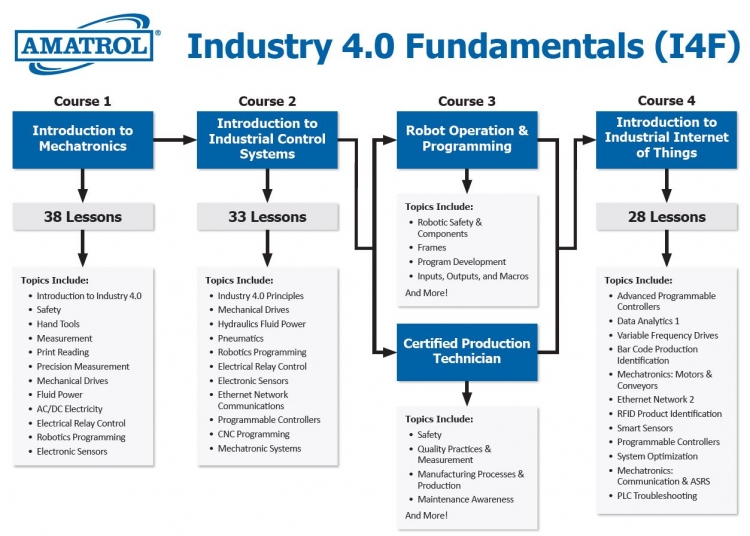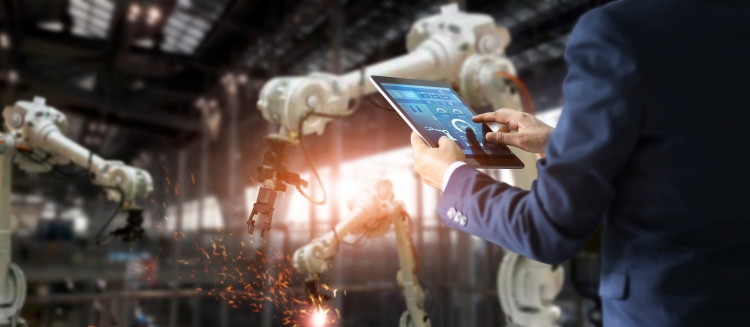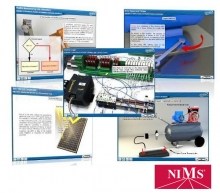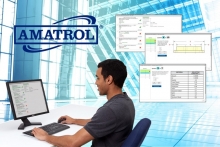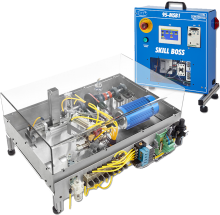Amatrol Industry 4.0 Fundamentals (I4F)
What is Industry 4.0?
Industry 4.0, also referred to as Smart Factory, the Industrial Internet of Things (IIoT), and other names, is the interconnection of industrial technologies to produce big data analytics, which promotes applications like predictive analysis (technology alerts you to a problem before it happens), prescriptive analysis (technology allows you to generate solutions before a problem occurs), and more. For more in-depth explanations and applications of Smart Factory / Industry 4.0, please reference the following articles:
- How Does Industry 4.0 Affect My Job? The Truth Behind Smart Automation
- What Is Needed for Smart Factory Capabilities? A Look Into Industry 4.0
- Study Shows Smart Factory Initiatives Paying Off for Early Adopters
- How to Transform Your Mechatronics System into a Smart Factory
How can Amatrol’s Industry 4.0 Program help prepare the workforce in my area?
I4F was developed by subject matter experts in conjunction with real-world feedback from industry and educational institutions to ensure that students with no background in manufacturing can begin with the basics like industrial safety, hand tool skills, etc., and build to industrial competencies in areas like PLC troubleshooting, mechatronics, and data analytics, as well as learning to program and operate a FANUC robot. This two-year program is divided into four major course areas, which are further divided into lessons covering major topics:
I4F Combines Thorough Multimedia Curriculum, Hands-On Skills, Virtual Training, and Skill Assessment
Amatrol’s Industry 4.0 training program utilizes a combination of learning methods to give students a robust experience in both theoretical knowledge and hands-on, real-world Smart Factory skills. Examples include:
Assessment
Amatrol provides pre- and post-lesson quizzes, as well as classroom-based skills performance assessments. The quizzes help learners to understand where their competency is weak or strong and how much they’ve learned from the lesson. The performance assessment evaluates how well learners perform hands-on skills.
Interactive Multimedia Curriculum
Amatrol’s eLearning offers flexible technical training through superb technical content depth as well as breadth and strong interactivity for skill development with 24 x 7 access. Eye-popping graphics, 3D simulations, videos, and complete explanations combine with strong interactivity to develop technical skills for modern Smart Factory manufacturing training.
Virtual Training
Amatrol’s Virtual Training uses virtual simulators to replicate hands-on equipment in such great detail that learners will feel like they are using the actual equipment. Learners perform essentially the same tasks using virtual trainers that they would be using the hands-on systems.
Hands-On Industrial Training
Amatrol’s hands-on training systems are designed by engineers and subject matter experts and hand-crafted, assembled, welded, wired, and painted at our facility in Jeffersonville, Indiana. These systems are loaded with real-world, industrial components for the closest possible experience to working on-the-job. They are heavy-duty and ready to stand up to frequent use and inexperienced users. Hands-On Systems used in I4F include:
Course 1: Introduction to Mechatronics
- Portable AC/DC Electrical (990-ACDC1)
- Portable Electrical Control (990-EC1)
- Portable Pneumatics (990-PN1)
- Portable Measurement Tools (990-MES1)
- Skill-Boss (95-MSB2AB)
- Portable Electronic Sensor (990-SN1)
- Pegasus Robot Simulation Software (14554)
- Tabletop Smart Factory Visual Communications Software (87-TVCAB)
- Tabletop Mechatronics Smart Factory Ethernet (87-TENAB82)
- Robotics 1 (96-ROB1)
Course 2: Introduction to Industrial Control Systems
- To teach more advanced concepts in each area, Course 2 also uses Course 1’s 990-SN1, 990-PN1, 990-EC1, 95-MSB2AB, 14554, 96-ROB1, 87-TVCAB, 87-TENAB82
- Robotics 2 (96-ROB2A)
- Portable Hydraulics 1 (990-BH1)
- Station 1 (87-TMS1) of Tabletop Mechatronics (870-PTAB82)
- CNC Machines 1 (96-CNC1)
Course 3: Industrial Robot Operations and Programming
- Course 3 will use a FANUC robot
Course 4: Introduction to Industrial Internet of Things
- To teach more advanced concepts in each area, Course 4 also uses Course 1’s 87-TVCAB, 87-TMS1, 95-MSB2AB, 87-TENAB82
- Tabletop Smart Factory
- Tabletop Mechatronics Bar Code Reader (87-TBR1AB)
- Portable PLC Troubleshooting (990-PABCL1F)

